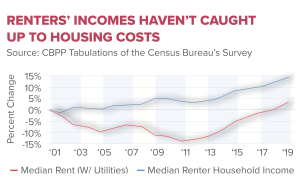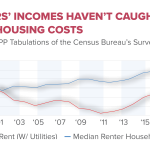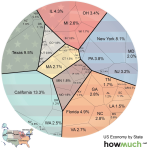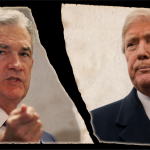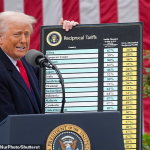In recent discussions, Senator Rick Scott has placed significant emphasis on tariffs as a pivotal element of U.S. trade policy, arguing that they are essential for leveling the playing field for American workers. As part of a sweeping measure implemented by the government, these tariffs have particularly targeted China, which Scott identifies as America’s primary economic rival. He believes that by imposing these tariffs, the U.S. can encourage other nations to reduce their own trade barriers, ultimately benefiting American manufacturers and reducing trade deficits. Critics, however, warn of the potential negative economic impact of tariffs, pointing to fears of inflation and market volatility. Despite this, Scott maintains that tariffs are a necessary tactic to ensure the prosperity of American workers by fostering a more competitive economic environment.
Senator Rick Scott’s recent endorsement of tariff measures reflects a broader strategy within U.S. trade practices aimed at enhancing the competitiveness of homegrown industries. By advocating for increased levies, especially against strategic competitors like China, he hopes to foster a more equitable marketplace for American labor. This approach resonates with the ongoing debate regarding trade policies and their implications for the overall economy, especially as economists assess the long-term ramifications of such tariffs on American employment and production capabilities. With the rising concerns over trade deficits and their impact on domestic growth, Scott’s arguments capture a crucial moment in the discussion on how trade dynamics can be reshaped to favor U.S. interests. As the landscape shifts, Scott’s perspective seeks to prioritize the needs of American workers amidst complex global trading relationships.
Understanding Rick Scott’s Tariff Strategy
Senator Rick Scott has been a vocal advocate for the tariff strategy initiated by the Trump administration, arguing that these tariffs are essential in creating a fairer economic environment for American workers. He believes that by imposing tariffs on foreign products, especially those from countries like China, the U.S. can push other nations to lower their own trade barriers. This notion aligns with the broader framework of U.S. trade policy, which aims to bolster domestic industries by leveling the playing field and mitigating unfair competition from abroad.
Despite the backlash from economists predicting negative repercussions for the U.S. economy, Scott maintains that tariffs will ultimately empower American workers. He emphasizes the need for the country to adopt a stance that prioritizes American manufacturing and jobs, rather than allowing cheap foreign imports to undercut local businesses. His perspective reflects a growing sentiment among many policymakers advocating for protective measures to support U.S. economic interests.
The Economic Impact of Tariffs on American Workers
The economic impact of tariffs is a contentious topic, particularly regarding their implications for American workers. Supporters, including Rick Scott, argue that tariffs can help reduce trade deficits and promote manufacturing by making foreign goods more expensive, thereby encouraging consumers to purchase domestic products. This, in theory, should lead to job creation and a revitalization of certain sectors within the economy, giving American workers a better chance to thrive.
However, critics argue that these protective measures may lead to increased prices for consumers and potential retaliation from trading partners, creating a cycle of economic tension. This could ultimately harm the very workers that tariffs are supposed to protect. The reality of the economic impact of tariffs manifests in a complex web of variables, including inflation, employment rates, and international relations.
Rick Scott’s Perspective on Trade Deficits
Senator Rick Scott has expressed strong beliefs about the need to address trade deficits with countries like China. He suggests that imposing tariffs is a key strategy for closing these gaps, thereby strengthening the American economy. By protecting American manufacturers from foreign competition, Scott argues that tariffs can help restore balance in trade relations and create a more favorable environment for U.S. businesses to flourish.
Scott’s assertion can be seen as part of a larger narrative that prioritizes a strong U.S. economic posture globally. Yet, this approach raises questions about its long-term sustainability and effectiveness. Many economists argue that while tariffs might offer short-term protection, they could lead to trade wars and higher consumer prices, ultimately making American goods less competitive in both domestic and international markets.
The Role of China in U.S. Trade Policy
China’s economic influence is at the forefront of discussions concerning U.S. trade policy, especially under the lens of Rick Scott’s commentary on tariffs. He views China as a significant threat to the American economy, arguing that stringent tariffs are necessary to combat their competitive edge. Scott believes that without strict measures, American workers will continue to be disadvantaged, losing jobs to cheaper foreign labor and imports.
This perspective is echoed in broader movements within U.S. trade policy aimed at curtailing the economic power of China. By introducing high tariffs on Chinese goods—now at an unprecedented 145 percent—Scott and other policymakers hope to deter imports and boost domestic production. However, this approach carries risks of escalating tensions and could provoke retaliatory tariffs from China, raising the stakes in an already complex global trade environment.
Evaluating the Effectiveness of Tariffs in Economic Growth
Evaluating the effectiveness of tariffs as a tool for economic growth hinges on multiple factors, including their impact on inflation and overall market stability. Rick Scott argues that by imposing tariffs, the government can support American workers and manufacturers, fostering a more robust economic framework. He asserts that eliminating trade barriers will encourage domestic sales and production, ultimately contributing to sustained economic growth.
Conversely, opponents question whether tariffs can truly drive growth or whether they might inadvertently lead to inflation due to rising costs of goods. They argue that the focus should instead be on comprehensive trade agreements that create a more stable and mutually beneficial trading environment without isolating the U.S. economy. This ongoing debate highlights the complexities and potential consequences of tariff policies in shaping the economic landscape.
The Link Between Tariffs and Inflation
The relationship between tariffs and inflation is a key concern among economists and lawmakers alike, including Rick Scott. While proponents like Scott argue that tariffs are necessary to protect American industries, they also pose questions regarding potential inflationary effects. Increased tariffs on imported goods typically lead to higher prices for consumers, which can exacerbate inflation rates and reduce purchasing power.
Scott’s admission that he is unsure about the exact effects of tariffs on inflation reflects the uncertainty that surrounds this issue. The potential for tariffs to drive up costs means that while they might offer short-term protection to American workers, they could also contribute to long-term economic challenges. Balancing these factors is crucial for formulating effective trade policies that support U.S. workers without igniting inflation.
Negotiating Trade Deals Versus Tariffs
The debate over negotiating trade deals versus imposing tariffs is pivotal in discussions about U.S. economic policy. Rick Scott’s advocacy for tariffs suggests a belief that a more confrontational approach is necessary to achieve favorable outcomes for American workers. However, many analysts, including Jason Furman, contend that negotiated agreements could yield better results without the collateral damage associated with tariffs, such as volatile stock markets and economic downturns.
Scott’s perspective tends to prioritize immediate action over long-term negotiation strategies, believing that only by imposing tariffs can the U.S. apply the necessary pressure on trading partners like China. This hardline stance, while politically appealing to some, raises important questions about the future of U.S. trade policy and its impact on the global economic landscape.
The Social Implications of Tariff Policies
The social implications of tariff policies extend beyond mere economics, touching on issues of employment, consumer behavior, and national identity. As Rick Scott defends the use of tariffs to protect American workers, it becomes evident that such policies can also foster a sense of national pride and solidarity among certain segments of the population, particularly those who feel threatened by globalization.
However, the social ramifications can also be negative, as certain groups may bear the brunt of rising prices due to tariffs. The dual nature of these policies poses challenges for policymakers who must consider both the societal and economic impacts of their decisions. The way tariff policies are structured can influence not only the economic landscape but also the social fabric of American society.
Future Perspectives on U.S. Trade Policy
Looking ahead, the future of U.S. trade policy remains uncertain, particularly in light of Senator Scott’s tariff strategies. As global economic dynamics shift and countries reassess their trade relationships, the effectiveness of tariffs as a tool for stimulating the economy will be scrutinized. Scott’s unwavering belief in the protective power of tariffs may evolve as the economic effects become clearer and as pressure mounts for more balanced trade agreements.
Furthermore, the interplay between tariffs and international relations will play a crucial role in shaping future U.S. trade policies. As tensions with China continue, Scott’s approach could either catalyze a new phase of American economic independence or escalate into further conflicts. How these policies are executed and their reception both domestically and globally will ultimately dictate the trajectory of U.S. trade policy in the years to come.
Frequently Asked Questions
What are Rick Scott’s views on tariffs and their impact on US trade policy?
Senator Rick Scott supports tariffs as a means to level the playing field for American workers against countries like China. He believes that by imposing tariffs, the U.S. can encourage other nations to reduce their own barriers to American products, helping to bolster U.S. trade policy.
How do Rick Scott tariffs affect American workers and the economy?
Rick Scott argues that his proposed tariffs will ultimately benefit American workers by allowing them to sell more products without facing trade barriers. However, there are concerns about the economic impact of tariffs, including potential volatility in markets and a contraction in GDP.
What are the economic implications of Rick Scott’s stance on China tariffs?
Rick Scott’s approach to tariffs, particularly against China, reflects his belief that these measures are necessary to combat China’s economic power. He advocates for substantial tariffs, asserting that without them, U.S. manufacturers and workers face an uneven trading environment, which could exacerbate trade deficits.
Will Rick Scott’s tariffs help reduce trade deficits with China?
While Rick Scott believes that his tariffs will help close trade deficits by making American products more competitive, many economists disagree, arguing that such tariffs could negatively impact the overall U.S. economy.
What is Rick Scott’s perspective on the relationship between tariffs and inflation?
Senator Scott has expressed uncertainty regarding how tariffs may influence inflation. He suggests that controlling inflation will depend more on balancing the budget than on the direct effects of tariffs.
How did Rick Scott react to discussions of negotiating trade deals instead of imposing tariffs?
In discussions about whether the White House could better negotiate trade deals instead of relying on tariffs, Rick Scott maintained that imposing tariffs was a necessary step to protect American workers and encourage fairer trade practices.
| Key Point | Description |
|---|---|
| Rick Scott’s Defense of Tariffs | Scott argues tariffs will protect American workers and encourage other nations to lower their own tariffs. |
| Impact on U.S. Trade Policy | A series of tariffs has been announced as part of changing long-term U.S. trade strategy. |
| Concerns About China | Scott views China as a significant economic threat and endorses severe trade measures. |
| Economic Consequences | Critics, including economists, claim tariffs could harm the U.S. economy, while supporters argue they will benefit American workers. |
| Approach to Trade Negotiations | Scott prefers either no trade with China or simple agreements without mutual barriers. |
| Inflation Concerns | Scott is uncertain of the effects of tariffs on inflation but believes a balanced budget is key to control it. |
Summary
Rick Scott tariffs are a controversial topic in American economic policy as they aim to protect U.S. workers while pressuring other nations to reduce their trade barriers. Senator Scott defends these tariffs as a necessary measure to help boost American sales and safeguard jobs, particularly in response to competition from nations like China. Despite the potential for economic downturn, he believes that a robust tariff strategy can eventually lead to a more favorable trade environment for the U.S. and American workers. However, this approach faces criticism from economists who argue that such tariffs may worsen economic conditions.



